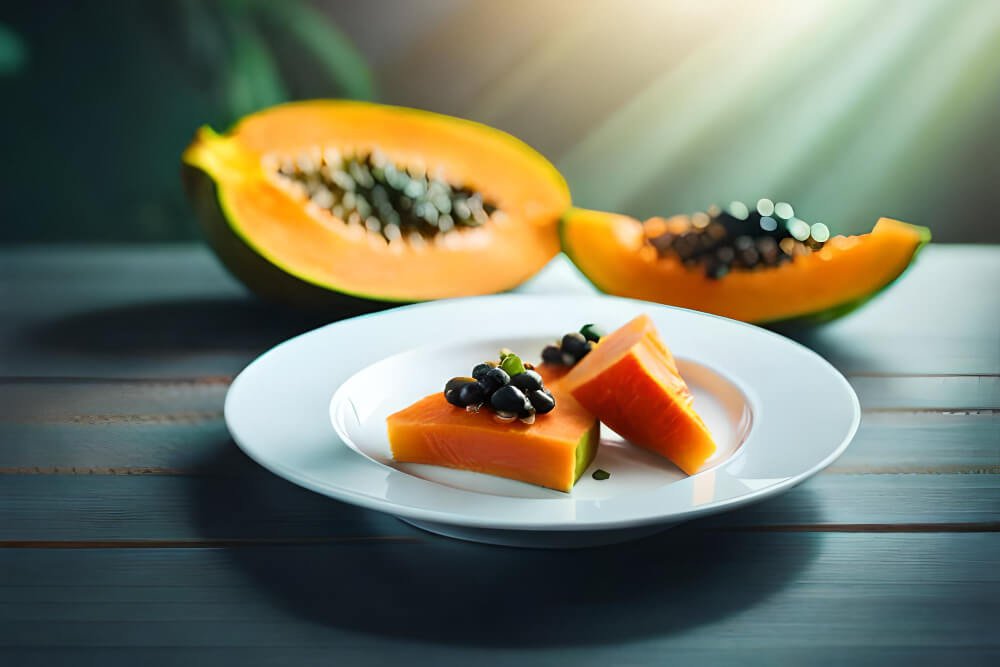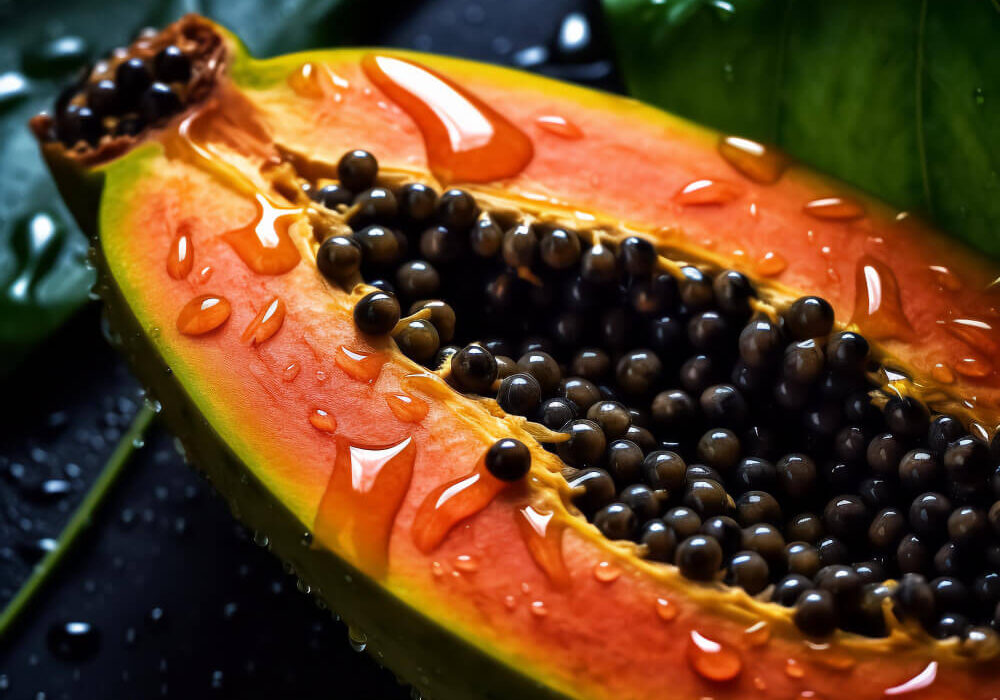This antioxidant-rich and nutritional powerhouse fruit has so many health benefits that it will set your taste buds on fire!
Papaya, a tropical fruit rich in vitamins, minerals, and antioxidants, offers a variety of health benefits that may improve overall well-being. Recognized for its sweet taste and vibrant orange colour, this fruit is a favourite in culinary circles and a staple in traditional medicine. The unique profile of phytochemicals found in papaya includes papain, an enzyme that aids digestion, and chymopapain, used to treat inflammation.
The research underscores the connection between consuming papaya and reducing health risks. With elements that support the immune system and may protect against certain diseases, papaya can be a valuable addition to a balanced diet. It’s not just the flesh that’s beneficial; the seeds and leaves also contain compounds that might have medicinal properties.
Consuming papaya may lead to significant improvements in health, such as better digestion, reduced inflammation, and a stronger immune system. These potential health benefits make it an important fruit for both dietary and therapeutic purposes.
Nutritional Profile of Papaya
Papaya is celebrated for its dense nutrient content and low-calorie profile. It contains an array of vitamins, minerals, and antioxidants essential for maintaining good health. Here’s a breakdown of what a typical papaya offers:
Vitamins:
- Vitamin C: Known for its immune-boosting properties, papaya is loaded with this vitamin, providing more than the daily recommended value in a single serving.
- Vitamin A: Important for eye health and immune function, vitamin A is present in papaya mainly in the form of provitamin A carotenoids.
- Folate (Vitamin B9): Essential for cell function and tissue growth, making papaya a beneficial choice for pregnant women.
Minerals:
- Potassium: Aids in regulating blood pressure and is crucial for proper cell functioning.
- Calcium: Key for bone health and muscle function.
- Magnesium: Important for many biochemical reactions in the body.
Other Nutrients:
- Fibre: Papaya contains dietary fibre, which supports digestive health and helps maintain a healthy weight.
- Antioxidants: It contains abundant antioxidants, like lycopene and beta-carotene, which help fight free radicals and reduce oxidative stress.
The papaya’s enzyme, papain, deserves a special mention. This proteolytic enzyme aids in digestion and can be particularly helpful in breaking down tough protein fibers.
For those monitoring their calorie intake, papaya is an excellent choice due to its low calorie but high nutrient density, making it a fruit that one can confidently incorporate into a health-conscious diet. Its sweet, tropical flavor and versatile use in both culinary and traditional medicine further underscore the nutritional and medicinal value of papaya as an admirable addition to daily nutrition.

One: Immune System Support
Eating papaya contributes significantly to the support of the immune system, primarily through substantial levels of Vitamin C and antioxidant properties which are integral to maintaining overall health.
Vitamin C and Immunity
Papaya is an excellent source of Vitamin C, a nutrient essential for immune function. Just one medium papaya can provide more than double the recommended daily amount of Vitamin C. This vitamin supports the immune system by enhancing the production of white blood cells, which are key to fighting infections. The presence of Vitamin C in Carica papaya increases regulatory T cells and can help in reducing pro-inflammatory immune cells, which is an important part of the body’s response to pathogens.
Antioxidant Effects
Papaya contains various antioxidants like carotenoids and flavonoids. Antioxidants help in neutralizing free radicals, thereby preventing them from causing harm and inflammation that can suppress the immune system. The specific enzymes found in papaya, such as papain and chymopapain, also contribute to its anti-inflammatory effects. Consuming papaya has been linked with modulating the immune system, which includes regulating both the innate and adaptive immune responses, according to studies on the anti-inflammatory and immunomodulatory properties of Carica papaya.
Two: Digestive Health
Eating papaya can support digestive health through its rich enzyme content and ample dietary fiber.
Enzymes in Papaya
Papaya contains a potent enzyme called papain, which helps break down proteins into smaller, easier-to-digest fragments. This can be particularly beneficial for individuals who experience digestive discomfort after eating protein-rich meals. Another enzyme, chymopapain, works alongside papain to further aid in protein digestion.
Fiber Content
Papaya is also high in dietary fiber, which is essential for maintaining good digestive function. Fiber adds bulk to the stool, which helps to prevent constipation and promotes regular bowel movements. The fruit’s soluble fiber can also provide a prebiotic effect, supporting beneficial gut bacteria.

Three: Anti-Inflammatory Properties
Papaya’s popularity in traditional medicine is largely due to its anti-inflammatory effects. Substances within papaya such as papain and chymopapain are noted for reducing inflammation. These enzymes can interfere with processes in the body that trigger swelling and pain in tissues.
A study examining the anti-inflammatory effects of Carica papaya revealed that its seed extracts can significantly inhibit inflammation. When papaya seed extract was used at a concentration of 10 μg/ml, it yielded a notable reduction in inflammation markers.
Furthermore, the leaves of the papaya have been used in boiling preparations, another traditional approach to harnessing papaya’s anti-inflammatory capabilities. These practices have been supported by research that confirms the leaves’ efficacy in this regard.
In vitro studies have also showcased papaya’s potential. Tests involving red blood cells suggest that papaya may stabilize cellular membranes, preventing hemolysis, which is indicative of its protective, anti-inflammatory properties.
In sum, papaya contains several compounds that contribute to its anti-inflammatory action:
- Papain: An enzyme that breaks down proteins and aids in digestive health.
- Chymopapain: Another enzyme working alongside papain to alleviate inflammation.
- Seed Extracts: Substances derived from papaya seeds that have been shown to lower inflammation markers in research.
Evidence supports the claim that regular consumption of papaya could potentially offer anti-inflammatory benefits, yet it should not replace medical treatment, and those interested should consult healthcare providers for personalized advice.

Four: Skin Health and Vitality
Papaya is a powerhouse of nutrients that can significantly enhance skin health and vitality. It is particularly revered for its rich content of vitamins and its versatile application in skin care routines.
Vitamins and Skin
Papayas are exceptionally high in vitamins A, C, and E, which are quintessential for maintaining healthy skin. Vitamin A helps in skin repair and maintenance, leading to smooth and vibrant skin. Vitamin C is a strong antioxidant that reduces the damage caused by free radicals, which can prematurely age skin. Also, the enzyme papain found in papayas assists in exfoliating dead skin cells, making the skin appear more luminous and firm.
Papaya in Skin Care Routines
Incorporating papaya into one’s skin care regimen can offer multiple benefits. The enzyme papain, as well as other alpha-hydroxy acids present in papaya, are known for their exfoliating properties and ability to dissolve inactive proteins and dead skin cells. Applying papaya pulp or extracts as part of a mask can be beneficial for softening and brightening the skin, which can be particularly useful for achieving a radiant complexion.
Five: Heart Health
Papaya offers numerous benefits for heart health, due in part to its content of vital nutrients that support cardiovascular function.
Potassium and Heart Function
The high potassium content in papaya is integral for maintaining proper heart function. Potassium helps regulate heartbeat and is crucial for muscle contractions, including the heart muscle. By including papaya in one’s diet, individuals can ensure they are getting a helpful dose of potassium to support their cardiovascular system.
Cholesterol-Lowering Effects
Papaya contains fiber and antioxidants, which can contribute to lowering LDL cholesterol levels. Lower LDL, often referred to as “bad” cholesterol, is associated with decreased risk of atherosclerosis and other heart diseases. Studies have found that the alkaloid components of papaya leaves can also have a positive effect on cardiovascular health.

Six: Eye Health
Papaya’s rich profile of antioxidants, including Vitamin A and carotenoids, is beneficial for maintaining good eye health. Beta-carotene, a type of carotenoid found in papayas, is particularly powerful. The body converts it into Vitamin A, which is crucial for preserving eyesight and reducing the risk of night blindness.
Studies have shown that papayas contain other carotenoids like lutein and zeaxanthin, which are found in the retina. These nutrients filter harmful high-energy blue wavelengths of light and help protect and maintain healthy cells within the eye. Consuming papaya may help safeguard the eyes against age-related macular degeneration (AMD), a common cause of blindness in the elderly.
Including papaya in one’s diet can provide these important carotenoids. Here’s a snapshot of their benefits for eye health:
| Nutrient | Benefit for Eyes |
| Vitamin A | Essential for good vision; reduces risk of night blindness |
| Lutein | Filters harmful blue light; supports retinal health |
| Zeaxanthin | Protects eye tissues from light damage; may slow AMD progression |
By incorporating papaya carotenoids to combat nutritional deficiencies, one can contribute to maintaining healthy eyesight and warding off degenerative eye diseases. It is advisable to consume a balanced diet that includes a variety of fruits and vegetables to cover the spectrum of nutritional needs for optimal eye health.
Seven: Potential Anticancer Properties
Research suggests that papaya may carry properties that could play a role in preventing and combating cancer. Although not conclusive, available studies hint at the fruit’s intriguing potential in this area.
Bioactive Compounds: Papaya contains several bioactive compounds, including lycopene and beta-carotene, which are known for their antioxidant properties. These compounds appear capable of reducing oxidative stress in the body, a factor that is implicated in the development of cancer.
In vitro Studies: A number of in vitro studies have explored how extracts from various parts of the papaya plant affect different types of cancer cells. For instance, black seeds of papaya are under investigation for their potential effects against certain cancer cells, due to their high polyphenol content.
Animal Studies: Further research involving animal models has shown promising effects of papaya’s components. In one study, giving papaya to diabetic rats resulted in considerable health improvements, suggesting potential for broader medicinal uses.
It is important to note that human trials are necessary to confirm these findings and to fully understand the impact of papaya on cancer. As of now, eating papaya as part of a varied diet is appreciated for its overall nutritional benefits, and any anticancer effects are considered a potential, additional advantage.

Papaya & Turmeric Smoothie
Equipment
- 1 High Speed Blender
Ingredients
What you need to buy
- 1/2 papaya medium peeled, chopped
- 1 banana
- 1 ½ cup coconut milk
- ½ tsp ground turmeric
- ½ tsp lime, juice
- 2 tbsp honey
- 1 scoop Vanilla protein
- 1 cup ice
Instructions
What you need to do
- Place all ingredients in a high-speed blender and blitz until smooth.
- Divide between 4 glasses and serve immediately.
Notes
Nutritional value
- 262 kcal
- 4g Fats
- 48g Carbs
- 13g Protein
- 3g Fiber
This recipe is
- Gluten-Free
- Dairy-Free
- Vegan
- Quick
Nutrition
Table of Contents
You can also follow me on YouTube for the latest, science-backed research on health, weight and weight training, and an endless supply of healthy recipes.
Download your FREE Fat Loss Recipe book here.
I appreciate your support.
